On April 3rd, the Central Committee of the CPI (Maoist) released a press statement saying that they are ready for peace talks if the Indian government halts its ongoing operations against them. Emphasising that they are always ready for peace talks in the interest of the people, the Maoist Party urged both the Central and State Governments to take sincere steps towards creating a positive and conducive atmosphere for meaningful negotiations. The Party also declared in the statement, “If the government responds positively to our call, we are prepared to immediately declare a ceasefire”. However, the Indian State has responded to this with a blatant refusal of any conditions put forth by the Maoists, showing its disregard towards any attempt to resolve the socio-economic and political questions.
It is to be noted that this statement for peace talks has come in the backdrop of the escalation of the Indian state’s military offensive to a genocidal scale in Bastar, and nearby regions, under the name of Operation Kagaar, cannot be ignored. To understand the urgency of the war-like situation in Bastar, and the hypocrisy of the officials of the government, who have been outrightly denying it, it is important to understand the brutal history of the ongoing war in central India.
The State’s Response to Peace Talks: A Clear Message of Hostility Towards Adivasis
The recent developments concerning the state’s response to calls for peace talks by the Maoists have exposed a troubling reality: the government is not interested in engaging in any constructive dialogue. By outrightly rejecting the terms put forth before engaging in any negotiations, the state is effectively shutting the door on the possibility of a ceasefire and a meaningful peace talk.
In response to the call for peace talks, Vijay Sharma, deputy chief minister of Chhattisgarh has given the following statements.
The Maoists, he said, want the state to stop setting up police camps. “They (Maoists) say if the state stops making police camps, we will pause the war. What is this war-like situation that you want to pause? There is no war situation… If you (Maoist) really want a discussion, we are ready… You can send an individual or a committee or (pick) any channel of your choice for a dialogue, and if a solution comes of it, honourable Amit ji and Vishnu Deo Sai ji will be very happy,” he said. Apparently for the Indian state, deployment of hundreds of thousands of troops, the use of drones for aerial bombings , mass arrests of nearly 1000 villagers and more importantly the gruesome murder of over 400 of its own citizens does not seem enough to be recognised as a war.
He further went on to show the state’s insensitivity towards the appeal for peace by saying- “They are talking about a ceasefire. I don’t understand how the discussion will take place with such terminology. I want to say again that neither the central or state government wants to fire a single bullet, and that’s the reason why the rehabilitation policy has been brought again. So many (Naxal) people surrendered and are being rehabilitated with an attempt to make their lives stable,” he said. Historically, ceasefire has been an integral part of peace talks and also recognised by international laws. Statements like these not only show the lack of seriousness towards international legal obligations that the Indian state has but also its failure in understanding the socio-political demands of its very own citizens. These demands are not only raised by the maoists but are legitimate demands of the adivasis in Bastar. Calling for complete surrender without resolving the questions not only belittles the aspirations of the adivasis of Bastar but also closes doors for political resolutions ultimately denying any genuine possibility of peace.
The statement of not wanting to fire a single bullet is a white lie of the Indian state , especially considering the prevalent practice of bounty killings in Bastar. There is a fixed bounty for each Maoist, and civilians are also then shown as maoists to avail that fixed amount. Security personnel are incentivized not to arrest, but to kill; the directive is clear: if a Maoist is spotted, they must be eliminated.
This raises a basic question – Why does the state need to go to war against its most deprived, impoverished and oppressed population, and inside its own territory?
Peace Vitiated: The State’s Legacy of Betrayals and Preconditions
The conditions put forth by the Maoist Party for peace talks with the government include the call for a ceasefire and an immediate cessation of all military operations in Bastar. One of the cornerstones of public security and self-determination, demilitarisation is vital for peace initiations. However, instead of using this opportunity to give assurances to the people of Bastar, the state’s refusal to accept these conditions echoes its recurring pattern of broken promises, deceitful negotiations, and outright betrayal.
The experience of peace talks in the past between the state and the Maoists, especially in 2004, 2010 and 2011, leave much room for concern. The way the government went back on peace agreements in 2004 when CPI (Maoist) entered into an open peace talks with undivided Andhra-Pradesh government and ultimately identifying and killing hundreds of CPI (Maoist) cadres, the way the Home Minister Chidambaram broke his promise to Swami Agnivesh and the dastardly manner in which the Maoist leader Cherukuri Rajkumar alias Azad who was finalising the process of peace talks was abducted and killed in a fake encounter in 2010, the abrupt overturning of the Orissa agreements and the killing of famous Maoist leader Kishenji while there was a dialogue for peace in West Bengal during the Lalgarh movement–the state has ridden roughshod over its agreements with the Maoists, to avert violence and move towards peaceful negations, on numerous occasions in the past.
The current state of arrests of key Maoist leaders, multiple military offensives under different guises, and the continuation of genocidal Operation Green Hunt in the form of Operation Kagar are all clear signs that the government’s real aim is not peace, but the suppression of dissent. Despite this, the historical possibility of peaceful negotiations still persists.
In light of the past experiences and ongoing hostilities, Abhay, the spokesperson of the Maoist party, has put forward a set of clear demands for the initiation of peace talks. These conditions are rooted in the fundamental principles of justice, human rights, and the Indian state’s obligations to international laws governing cease-fires and peace talks in an Non-International Armed Conflicts (civil war).
Immediate Cessation of Killings and Massacres in Chhattisgarh, Maharashtra (Gadchiroli), Odisha, Jharkhand, Madhya Pradesh, and Telangana being carried out under Operation Kagaar.
Limit the security forces in the existing camps and halt establishment of new camps.
These conditions put forward by the maoists, are in fact the demands of adivasis villagers as well. Thousands of adivasis have marched under the banner of Moolwasi Bachao Manch against the establishment of camps, arrests, rapes and massacres being carried out in the ongoing military offensive under the moniker of Operation Kagaar.
Repression of Democratic Organisations: Criminalising People’s Demands
The state’s decision to ban the mass organization Moolwasi Bachao Manch (MBM), under the Chhattisgarh State Public Security Act, is a clear attempt to threaten and silence the democratic voices of the people of Bastar who are trying to protect their land. By criminalizing organizations of tribal populations, the government has created an environment where even peaceful, unarmed democratic movements are treated as threats.
This approach is deeply concerning because it eliminates the space for dialogue and peaceful resolution. The state’s refusal to engage with these organizations and the demands of the Adivasi villagers, leaves no alternative option for adivasis, other than to resort to armed struggle. It is the state itself through its oppressive policies and refusal to address the root causes of the conflict, that pushes the people to pick up arms.
The state’s actions reveal a disturbing pattern: displacement, destitution, and death. It is a cycle that has repeated itself over decades, with Adivasis bearing the brunt of policies that prioritize corporate profits over human rights. The government’s failure to acknowledge the legitimate demands of these communities, coupled with its heavy-handed approach, only continues to deepen the crisis.
The fight put up by the Adivasis is thus about the survival of a people–their right to their land, their culture, and their dignity. The Adivasis are not victims of an insurgency—they are victims of a state machinery that has systematically marginalized them, denied them basic rights, and now seeks to erase their existence through displacement and militarization.
The world must recognize this for what it is: a systematic attempt to erase, displace, and destroy the Adivasi way of life. And to those in power, we say—this is not just a war against Maoists or Naxalites. It is a war against the people of India, against their history, their culture, and their future.
From Open Forests to Open Prison
Bastar is in Dandakaranya–a vast forested region, located in central India with slices taken from four different states of India. This region embraces parts of Madhya Pradesh, Maharashtra, Andhra Pradesh and Orissa. It is very rich in forest and mineral resources, and is spread across 1,10,000 square kilometers over eleven districts. An Adivasi-dominated area, historically, Dandakaranya has been home to the Gond, Khoya, Bhatra and other Adivasi communities who have lived here–their livelihood largely depending on the forest and its produce. However, right from the inception of the Indian state, the Adivasi peasantry in Dandakaranya have suffered exploitation and displacement at the hands of the state officials. Despite inhabiting one of the richest regions of the country, the irony is that the Adivasi communities of Bastar have been among the most marginalised groups in society. While laws in the name of forest protection and rehabilitation have displaced thousands of Adivasi families, the same forest land continues to be unconstitutionally and illegally leased out and sold to big corporations for mining and other forms of land encroachment by the state. The systematic dissolution of constitutionally guaranteed rights to Adivasi communities, such as the right to self-determination and self-governance, and the state’s blatant violation of international laws governing the cultural and political right to ancestral Adivasi land, is part of this scheme of unchecked corporate loot, whereby the nexus between the state and big corporates is unmistakably clear. Furthermore, all forms of democratic assertions, by the Adivasi communities, of their inalienable right to land and against the undemocratic practices of the state have seen a history of criminalisation and brutal military repression by the Indian state. In every sense, this repression is a war waged by the state against its own people, and this has been continuing for more than 20 years. From Operation Green Hunt to Operation Kagar, the shapeshifting offensive of the Indian state has targeted the central and eastern parts of India with a singular agenda–the loot and plunder of peoples’ resources by all means possible, including genocide, and the large-scale massacre of Adivasi communities trying to protect their land. In the past 7-8 years alone, almost 250 security camps and fortified police stations have been set up in Bastar, with a camp after every 2-5 kilometres! This has transformed the area into an open prison camp.
Operation Kagaar: The Final Offensive against Adivasi Resistance
The current phase of this brutal war is being carried out under the name of Operation Kagaar, launched by the BJP-led Hindutva fascist government. With the Home Minister, Amit Shah’s call to completely wipe out Maoists by March 2026, this new offensive is an attempt to crush the democratic resistance of Adivasi communities by any means necessary. The ensuing violence under Operation Kagar has been horrifying.
It began with a six month old infant killed in cold blood by the security forces, announcing the beginning of one of the most brutal attacks faced by the Adivasi peasantry since the time of the Bhumkal rebellion. Some of the state’s bloody achievements after the beginning of Operation Kagar include massacres of villagers and unarmed Maoists in fake encounters, such as the killing of three villagers in Nendra (January 19), two unarmed Maoists and four villagers in Chipurbhatti (March 27), ten villagers and two unarmed-ill Maoists in Pidiya (May 10), four villagers in Ghamandi forest (July 3), five villagers and two captured Maoists in Ghamandi (December 12) to name a few; the list is too long to be concluded. The mortar shells of the security forces have led to the deaths of two adolescent children. The civil rights activist, Soni Sori has also mentioned that there have been incidents where young girls, teenagers, were forced to wear the fatigues of the PLGA, who the security forces then attempted to kill in a fake encounter. There are several other incidents where innocent Adivasi peasants going towards a protest site were attacked– while many were shot and killed, some among them were arrested and tagged as Maoists. In once incident, a deaf girl by the name of Kamli Kunjam was dragged away from her bed, was raped and then killed by the security forces. Kamli was sick and was not even in a state to rise from her bed when she was abducted and raped by the forces. In addition to civilians, unarmed Maoists were captured and tied, tortured and killed. Often, Adivasi peasants who have a similar first name as that of the Maoists are abducted and killed or arrested. Many times, Adivasi peasants are kidnapped and then red-tagged as Maoists and then forced to surrender. Thousands of them have also been arrested. Such brazen acts of violence against the Adivasi peasantry have become commonplace, leading to the deaths of more than 400 people in the last two years, at the hand of a state which has promised to safeguard the rights and liberties of the people.
The True Motive: Corporate Loot and Adivasi Displacement
This war has, in fact, been going on for two decades–when the war against the people was first initiated in the form of the Salwa Judum and then Operation Green Hunt. From the beginning, the state had made its objective clear– to snatch the jal, jangal and jameen of the Adivasis. In 2008, Manmohan Singh, the ex-prime minister who had declared Maoism as the greatest internal threat, had even mentioned that the Maoists prevented the utilisation of resources by the corporates of the country. In these years, multiple MoUs have been signed with the corporates to sell the resources under the soil. Many of these MoUs are secretive in nature. This begs the question– Are the Maoists the real targets of the Indian state?
In the name of fighting the Maoists, the state wants to evacuate the entire area of the tribals, so that the land and forests can easily be handed over to multinational companies. This is not new– the new economic policy, since 1991, has repeatedly attacked whatever little access the poor had to forests, land, rivers, common pastures, village tanks and other common shared resources and public property. In each case, the attacks were justified in the name of development, whether as Special Economic Zones (SEZs), mining or industrial parks. In each case, it is the poor who lost their land and livelihood. For instance, in Niyamgiri, Orissa, which is home to several Dongria tribes, land was handed over to the multinational company, Vedanta and in Jagatsinghpur to POSCO, or in Kalinganagar to the Tatas; resulting in mass deprivation.
The Role of Foreign Powers and Zionists
What adds another layer of horror to this war is the involvement of foreign powers.The National Technical Research Organisation (NTRO), set up with the support of the NSA of the USA, has been instrumental in coordinating drone strikes against Indian citizens.
What is more alarming that the Indian state is the largest importer of arms globally and Israel’s biggest arms customer. Not only is the Indian state massacring people but it is also bombing on its very own soil. These aerial bombings are done by using the Israeli Heron Mark 2 drones.
The recently inaugurated Adani-Elbit Unmanned Aerial Vehicles (UAV) Complex reveals the alliance of land grabbers- Adani and Elbit representing Indian state and Israeli state respectively. Besides procuring large scale weaponry, UAV drones, missiles; the Indian state has also used Israeli surveillance technology, the Pegasus spyware to target and arrest the activists questioning India’s war on people in the interest of corporate loot. These arrests aimed at creating a war without witnesses. The arrests of the BK-16 activists, G.N Saibaba and Hem Mishra can be seen in the same light.
The alliance between the Indian and Israeli state and the massive purchase of advanced weaponry and spyware worth millions of dollars also means that Indian taxpayers’ money is indirectly funding the genocide in Palestine, while Adivasis in India are being systematically exterminated under the pretext of “national security.”
OUR POSITION ON PEACE TALKS
In the last two years, the brutal war waged by the Indian state has claimed over 400 lives, with most of them being Adivasis. Among them, 40% are women, and more than 35% of them are villagers. Around 200 were ordinary villagers and unarmed, injured or recuperating maoists. The present civil war situation necessitates that an intervention is made to create a viable situation for any peace talks, especially with past experiences of betrayals from state’s side in 3 peace-processes. We believe that it is the state’s responsibility to ensure that a viable situation of talks is created through ceasefire encompassing cessation of killings, tortures, arrests of Adivasis and Maoists alike; limiting security personnels to existing camps and halt on construction of new camps. This responsibility is even greater, considering that the breach of trust by the state in past attempts of talks had created hostilities for 13 years before this renewed effort of talks could now be initiated by the Maoists. Furthermore, we believe that peace talks must encompass political dialogue to resolve the socio-economic and political questions raised by the movement, a fact that the state’s own committees have accepted in the past. Without addressing the questions and resolving the conditions prevalent in the society that give rise to such forms of people’s struggles, peace can no way be achieved in the way Chhattisgarh Home Minister Vijay Sharma is claiming to achieve i.e., by unconditional surrender without addressing the problems and further carrying out the plunder of mineral resources of these regions at the same time, through the might of armed hand of the state. Such approach will only deepen the gap and increase hostilities and although unlikely but even if an unprincipled “peace” is achieved, it will be a fragile one and likely to fall apart amid state’s policy of dispossession, displacement and plunder in the interest of Big-Indian corporates and foreign corporates. We say this in light of the historical struggles like Bhumkal and Santhal Rebellion being waged by the Adivasis to protect their Jal-Jungle-Jameen; therefore this struggle and the various forms it assumes including armed struggle, is not limited to Maoists but is something that precedes them.
Furthermore, This war is not just about insurgency and law and order, or national security and development; it is part of a larger, more sinister agenda. The ongoing repression is crucial to the consolidation of the Brahmanical Hindutva Fascist Indian state under Surajkund Scheme (2022), which seeks to achieve its so called “Vision 2047 for Viksit Bharat” to build a “Hindu Rashtra” on the blood and suffering of India’s very own people. The development narrative being pushed by the state is fueled by displacement, genocide, and the exploitation of Adivasi lands for corporate loot.
Today, the future of India is at a crossroad. We appeal to all farmer and working class organizations, students, activists, intellectuals, and friends in the media to rise in solidarity with the oppressed and the exploited. It is time to demand that the government engage in genuine peace talks by adhering to the demands of the people of Bastar and conditions of the Maoists; free from coercion, repression, and the heavy hand of military force.This call for peace is not just the call of the Maoists—it is the fight of every citizen who believes in justice, democracy, and the sovereignty of the people.
-forum against corporatization and militarization


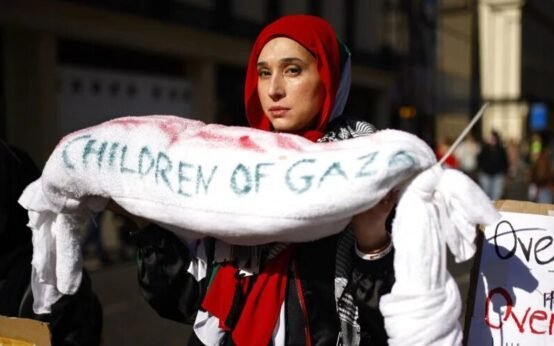 గాజాపై మారణ హోమం: దాడికి వెళ్ళనందుకు స్వంత సైనికులను జైల్లో పెట్టిన ఇజ్రాయిల్
గాజాపై మారణ హోమం: దాడికి వెళ్ళనందుకు స్వంత సైనికులను జైల్లో పెట్టిన ఇజ్రాయిల్ 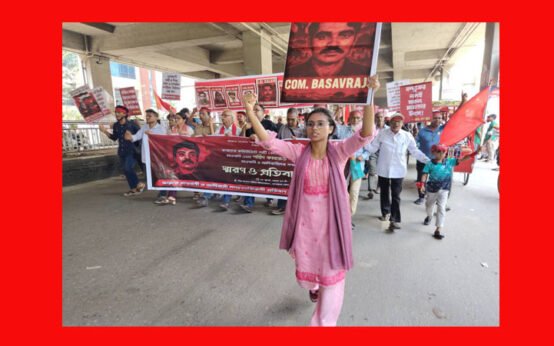 భారత్ లో మావోయిస్టులు, ఆదివాసులపై ప్రభుత్వ హత్యకాండకు నిరసనగా బంగ్లా దేశ్ లో ప్రదర్శన
భారత్ లో మావోయిస్టులు, ఆదివాసులపై ప్రభుత్వ హత్యకాండకు నిరసనగా బంగ్లా దేశ్ లో ప్రదర్శన 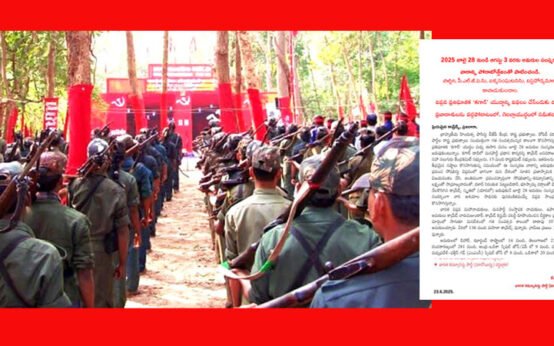 ఈ నెల 28 నుంచి అమరుల సంస్మరణ వారాన్ని పాటించండి – మావోయిస్టు పార్టీ పిలుపు
ఈ నెల 28 నుంచి అమరుల సంస్మరణ వారాన్ని పాటించండి – మావోయిస్టు పార్టీ పిలుపు 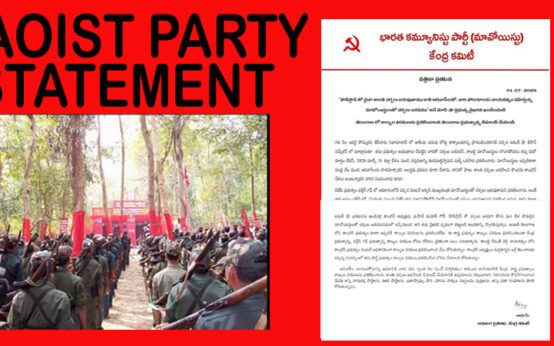 ‘పీసీసీ అధ్యక్షుడి ప్రకటనను స్వాగతిస్తున్నాం, తెలంగాణ ప్రభుత్వం కాల్పుల విరమణ ప్రకటించాలి’
‘పీసీసీ అధ్యక్షుడి ప్రకటనను స్వాగతిస్తున్నాం, తెలంగాణ ప్రభుత్వం కాల్పుల విరమణ ప్రకటించాలి’ 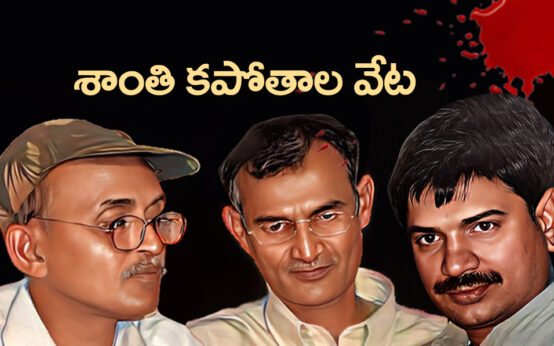 శాంతి కపోతాల వేట!
శాంతి కపోతాల వేట! 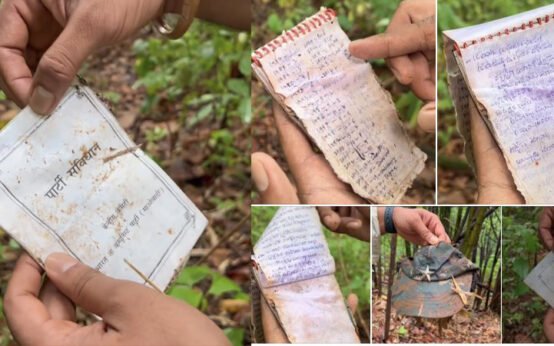 గుండెకోట్ గుండె కోత – ఎన్.వేణుగోపాల్
గుండెకోట్ గుండె కోత – ఎన్.వేణుగోపాల్ 